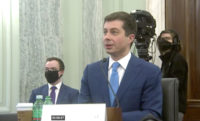After facing questions from the Senate Health, Education, Labor and Pensions Committee on topics such as pay and safety rules and worker training, R. Alexander Acosta, President Trump’s nominee to head the Dept. of Labor, won, or retained, support from the panel’s Republicans, but at least a couple of Democrats didn’t endorse him.
Wrapping up the nearly three-hour confirmation hearing on March 22, committee Chairman Lamar Alexander (R-Tenn.) said he was sure that Acosta, a former National Labor Relations Board member and Justice Dept. official, will be confirmed. [Link to hearing web page, including webcast.]
Alexander told ENR that the committee could vote on Acosta’s nomination as early as the end of March.
But the panel’s top Democrat, Patty Murray (Wash.), told Acosta that she had “some serious concerns” about his nomination. Murray said that “the secretary must be an independent voice for workers who will push back on the president’s agenda to hurt working families.”
Sen. Elizabeth Warren (Mass.) is an almost certain “no” vote. Warren was clearly unhappy with Acosta’s noncommittal replies to her questions about whether he would take action concerning several Obama administration labor-related regulations. They include an Occupational Safety and Health Administration rule, issued in March 2016, tightening the construction and general industry standards for exposure to airborne silica dust and one increasing the number of workers eligible for overtime pay. That rule has been challenged in federal courts.
Warren said, “You have dodged every one of my questions.” She added, “If you can’t give me straight answers on your views…and commit to stand up for workers on these obvious and very important issues, then I don’t have any confidence you’re the right person for this job.”
Besides the discussion about the silica rule—and Acosta’s brief mention that an infrastructure investment program “is certain to bring back a lot of jobs”—the committee didn’t delve into construction-specific labor issues. Absent from the hearing were questions about the Davis-Bacon prevailing-wage law and project labor agreements on federally funded construction contracts.
A prime topic of discussion was the Labor Dept. rule, published on May 23, raising the salary threshold at which companies must pay workers overtime. The new benchmark is a salary of at least $47,476 per year; the old threshold was $23,660. The rule also called for updating the salaries every three years.
A federal district court judge issued a preliminary injunction on Nov. 22, barring the regulation from taking effect on Dec. 1, when it was scheduled to do so. Thus, the old $23,660 level has remained in effect.
The Obama administration had filed a notice that it intended to appeal the injunction, but the appellate court granted the Trump administration a 60-day extension to decide how it would proceed. The new deadline for filing an appeal is May 1.
Alexander said the regulation would force small businesses to cut their workforces. But Murray defended the rule, saying, “I think it’s an issue of fairness. I really do believe the secretary of Labor’s job is to make sure that workers are treated fairly.”
The topic of worker training programs also came up. Acosta called for improving efforts to match training with skills needed in today’s economy, particularly as technology changes the types of jobs available. Lawmakers also worried about the impact of Trump's proposed 21% budget cut for DOL, on programs such as assistance to workers who lose jobs because of foreign trade.
Trump announced Acosta’s nomination on Feb. 16, after his first choice for the job, Andrew Puzder, CEO of CKE Restaurants, withdrew, reportedly because of a variety of issues, including a failure to pay employment taxes for a household employee.
Acosta was an NLRB member from December 2002 to August 2003, and then became assistant attorney general for the Justice Dept.’s civil rights division. He later was U.S. attorney for the Southern District of Florida. In 2009, he was named to head Florida International University’s law school.



